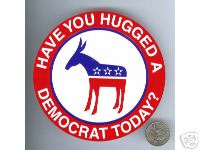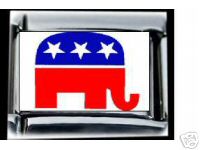House Tax Writers Contemplate Overhaul
And the “politics” of politics roll on. If this article doesn’t shout out that we need tax reform, I don’t know what else would. This shows the deep pressure for politicians to keep the tax loopholes in place. Notice, the first politician talked about here, Charlie Rangel is the representative I mentioned in an earlier article… one of the few that oppose the FairTax.
Also, who is Chairman Bill Thomas kidding? Being concerned about tax incentives (loopholes) is one thing. However, the promotion of savings is a great boost to our economy. Saving money and subsequently investing it, grows money (the economy). Has he not heard of the time-value of money? If you save money as a country, you have more to spend in the future (money for poor people to pay bills with). About his class warfare statement, has he ever gotten a job from a poor person? Wealthy people, that need more incentives to save, create the jobs of this country.
I fear that too many politicians get trapped in the game of money for themselves and not their constituents. But my biggest fear is that it will only take several HONEST Washington politicians at one time to make the necessary changes for our government. We have been very short on those, since the beginning of time.
06.08.2005, 04:23 PM
Associated Press
House tax writers contemplated the difficulty of abolishing tax breaks in the name of simplicity on Wednesday while considering ideas to overhaul federal tax laws.
"I came to Congress to close up all the tax loopholes," said Rep. Charles Rangel, the top Democrat on the House Ways and Means Committee. "How little did I know that so many would be incentives."
Lawmakers typically design tax breaks to encourage or support certain behaviors. They span from business credits for creating jobs and providing health insurance to personal deductions for education and mortgage expenses.
Rangel asked for help from economists, assembled to explain competing tax proposals, as the tax writers consider whether to keep or drop tax breaks and pick winners and losers.
"There's a long list of things, and a lot of them are political, a lot of them are special interests, a lot of them are well intended," said Rangel of New York.
The tax experts urged the committee to shed some tax breaks. The hearing set the stage for a report later this summer from a presidential commission studying ways to make taxes simpler, fairer and more economically productive.
President Bush's Advisory Panel on Federal Tax Reform has already said the tax laws contain too many deductions and credits, and that the first purpose of taxes is to raise money to fund the government.
Leonard Burman, co-director of the Tax Policy Center, told the committee that the tax deductions and credits embedded in the tax system tell middle-income families to pay tax and then "if they jump through a whole bunch of hoops they can get a bunch of it back."
"We're saying that certain people get a benefit, other people don't. People are working really hard at determining their tax liability," Burman said.
Rep. Nancy Johnson, R-Conn., said tax incentives have proved themselves as an efficient way to get government benefits to many people at a low cost.
"I think the record demonstrates their power," Johnson said. "You've got to have better information for me to convince me that tax credits aren't powerful or important in structuring a society."
R. Glenn Hubbard, dean of Columbia University's Graduate School of Business and Bush's chief economic adviser from 2001 to 2003, said most economists agree tax incentives are powerful.
"They do stimulate the desired activity almost always," Hubbard said. "The question is, are they the best way of doing that?"
Ways and Means Committee Chairman Bill Thomas, R-Calif., said he's concerned about tax incentives, especially those that promote savings, that help wealthier taxpayers but don't provide a big enough incentive for poorer taxpayers.
"I'm worried about the person who's worried about the first dollar saved," Thomas said after the hearing. "I'm not interested in creating new ways for rich people to make more money."
Also, who is Chairman Bill Thomas kidding? Being concerned about tax incentives (loopholes) is one thing. However, the promotion of savings is a great boost to our economy. Saving money and subsequently investing it, grows money (the economy). Has he not heard of the time-value of money? If you save money as a country, you have more to spend in the future (money for poor people to pay bills with). About his class warfare statement, has he ever gotten a job from a poor person? Wealthy people, that need more incentives to save, create the jobs of this country.
I fear that too many politicians get trapped in the game of money for themselves and not their constituents. But my biggest fear is that it will only take several HONEST Washington politicians at one time to make the necessary changes for our government. We have been very short on those, since the beginning of time.
06.08.2005, 04:23 PM
Associated Press
House tax writers contemplated the difficulty of abolishing tax breaks in the name of simplicity on Wednesday while considering ideas to overhaul federal tax laws.
"I came to Congress to close up all the tax loopholes," said Rep. Charles Rangel, the top Democrat on the House Ways and Means Committee. "How little did I know that so many would be incentives."
Lawmakers typically design tax breaks to encourage or support certain behaviors. They span from business credits for creating jobs and providing health insurance to personal deductions for education and mortgage expenses.
Rangel asked for help from economists, assembled to explain competing tax proposals, as the tax writers consider whether to keep or drop tax breaks and pick winners and losers.
"There's a long list of things, and a lot of them are political, a lot of them are special interests, a lot of them are well intended," said Rangel of New York.
The tax experts urged the committee to shed some tax breaks. The hearing set the stage for a report later this summer from a presidential commission studying ways to make taxes simpler, fairer and more economically productive.
President Bush's Advisory Panel on Federal Tax Reform has already said the tax laws contain too many deductions and credits, and that the first purpose of taxes is to raise money to fund the government.
Leonard Burman, co-director of the Tax Policy Center, told the committee that the tax deductions and credits embedded in the tax system tell middle-income families to pay tax and then "if they jump through a whole bunch of hoops they can get a bunch of it back."
"We're saying that certain people get a benefit, other people don't. People are working really hard at determining their tax liability," Burman said.
Rep. Nancy Johnson, R-Conn., said tax incentives have proved themselves as an efficient way to get government benefits to many people at a low cost.
"I think the record demonstrates their power," Johnson said. "You've got to have better information for me to convince me that tax credits aren't powerful or important in structuring a society."
R. Glenn Hubbard, dean of Columbia University's Graduate School of Business and Bush's chief economic adviser from 2001 to 2003, said most economists agree tax incentives are powerful.
"They do stimulate the desired activity almost always," Hubbard said. "The question is, are they the best way of doing that?"
Ways and Means Committee Chairman Bill Thomas, R-Calif., said he's concerned about tax incentives, especially those that promote savings, that help wealthier taxpayers but don't provide a big enough incentive for poorer taxpayers.
"I'm worried about the person who's worried about the first dollar saved," Thomas said after the hearing. "I'm not interested in creating new ways for rich people to make more money."




0 Comments:
Post a Comment
<< Home